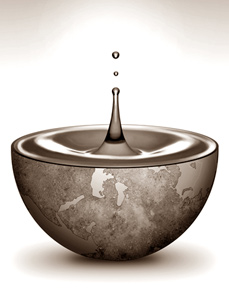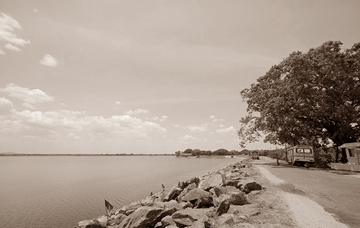|
International Water Week :
Focus on the precious liquid
by Sajitha PREMATUNGE
The World Water Week organized by the Stockholm International Water
Institute ended yesterday, where various significant topics were
discussed such as the wise use of land and water resources, balancing
competing claims for water, food and energy, rainfall variability and
climate change, water and sanitation, improving access to water supply
in small towns, water governance, etc... many of which were also
applicable in the Sri Lankan setting.
 The Stockholm International Water Institute has been focusing the
planet’s water issues since 1991. The World Water Week draws attention
of all the stakeholders such as policy making, scientific, business and
civic communities concerning water related issues for the exchange of
their views, concerns and experiences toward water-related challenges
and their impact on the world’s environment, health, economic and
poverty reduction agendas. By doing so it is expected to start a new
thinking, cooperative and positive action to deal with the water related
issues. The Stockholm International Water Institute has been focusing the
planet’s water issues since 1991. The World Water Week draws attention
of all the stakeholders such as policy making, scientific, business and
civic communities concerning water related issues for the exchange of
their views, concerns and experiences toward water-related challenges
and their impact on the world’s environment, health, economic and
poverty reduction agendas. By doing so it is expected to start a new
thinking, cooperative and positive action to deal with the water related
issues.
“There is no water without weather” said Vidya Jyothi Deshamanya
Prof.Chris Panabokke. He explained that even before Sri Lanka was
affected by climate change, the annual variation of rainfall was
somewhere around 9.3 mm, the highest in the world. Moreover he said that
the more than the amount of rain the behavioral change within and
between seasons is important. “The change of variability of rainfall was
the highest in the world even before climate change was even an issue.”
This variability has changed so irreparably that past data can no longer
be used to predict anomalies.
“Our surpluses and deficiencies will be more marked with the increase
of climate change.” Prof. Panabokke cautioned that disregarding the
effect that climate change could have on Sri Lanka’s water resources is
no longer an option. He pointed out that it is of utmost importance to
study water in its natural state.
Prof. Panabokke said that as in any other region of the world
deforestation is a major issue that affects not the quantity but the
distribution of water. He emphasized that the pattern of variation in
precipitation is more important than the lump sum.
 Ground water is a significant water source for Sri Lanka, which is
unfortunately also very limited, especially in hard rock regions like
Jaffna and in ‘coastal sand’ areas like Nilaveli and Kalpitiya. An ever
increasing exertion is applied on this limited and precious resource by
coning - shooting of brackish water - and over utilization. He
emphasized that human consumptions needs should always be given priority
over agriculture, when considering ground water requirements. Ground water is a significant water source for Sri Lanka, which is
unfortunately also very limited, especially in hard rock regions like
Jaffna and in ‘coastal sand’ areas like Nilaveli and Kalpitiya. An ever
increasing exertion is applied on this limited and precious resource by
coning - shooting of brackish water - and over utilization. He
emphasized that human consumptions needs should always be given priority
over agriculture, when considering ground water requirements.
Wijerathne Bohingamuwa, Department of History and Archaeology,
University of Ruhuna, also explained that during the ancient times water
stored or diverted from the rivers - other than agriculture - was used
for dirking, animal husbandry, sanitation and even for the
beautification of the gardens,.
Another issue discussed in the International Water Week, that Sri
Lanka can also relate to was improving access to water supply in small
towns.
Bohingamuwa explained that the failure to bring about a sustainable
solution to the world water issues such as providing sufficient and
unpolluted water for the purpose of drinking, agricultural and other
requirements of the people hampers the prospects for billions of people
locked in a cycle of poverty and disease. The UN Millennium Project Task
Force on Water and Sanitation also recognizes the significance of
integrated development and management of water resources for achieving
the millennium development goals as water is central to the livelihood
systems of the poor.
Prof. Panabokke pointed out that tube wells were a huge boon in
combating this issue, almost 30% of which are no longer in use. “Hard
rock regions are the problem areas” said Prof. Panabokke.
He pointed out that the issue of access to water supply affects
mostly the dry zone, where water quantity is limited especially during
the dry season.
“Our ancient irrigation system is like nothing else in the world,
even from irrigation systems in the Deccan” he further illustrated the
subject saying that the ancient Sri Lankan irrigation system was
developed on a hard rock basement and not alluvials.
He explained that rather than large dams small dams are more suitable
for a country like Sri Lanka.
Smaller dams augment and stabilize the ground water table.Speaking of
the strategies and the practices of water conservation and management of
the ancient hydraulic civilization of Sri Lanka, Bohingamuwa, said: “The
focus of World Water Day 2009 is on sharing water, sharing
opportunities. This is a great opportunity for us to draw our attention
to the gravity of the issue of the day. It will be better if we focus
our attention more towards our own ancient methods which we easily tend
not to give due consideration.
Bohingamuwa explained that the Ancient Civilization of Sri Lanka,
generally speaking, came up in the ancient Rajarata region, has
frequently been termed as a Hydraulic Civilization.
This is because the irrigation and water management system that
lasted until the end of 12th century AD or so brought about all the
glory and the prosperity that we see in terms of archaeological marvels.
“The economic basis that provided the foundation for undertaking such
a huge task was provided by the effective and sustainable water
management system of ancient Sri Lanka.”
As Bohingamuwa pointed out Henry Parker says it best, “In Pre-
Christian times the Ceylonese had attained the knowledge of controlling
the water of streams.
Extensive works of irrigation secured with immense labour, skill and
science had transformed the arid plains in to prosperity at a period
when Europe was in the rudest and most primitive state”.
And as King Maha Parakrambahu said one of the most ancient principles
of water conservation and utilization as practices have been to ‘not let
even a drop of rain water escape to the sea without benefiting the
people of my land’.
Culavamsa records he constructed or restored 165 dams, 3910 canals,
163 major tanks and 2376 minor tanks, including his greatest legacy the
Parakrama Samudra, with an embankment 8 1/2 miles long and rising to a
height of 40 feet.
Bohingamuwa explained that Sri Lanka is a pioneering nation that
thought of conserving and making best use of the rain water.
“But the trouble this nation has is that we have forgotten our own
roots, our own principles and methods of water management and
conservation.” He further explained that human societies progressed by
trial and error and therefore they are based on accumulated knowledge of
the past. “Knowledge of ancient science and technology might save a lot
of time we waste to rediscover them.”
He explained that Sri Lanka’s tanks are beautifully distributed in
the cascades one below the other conserving water and soil and most
effectively utilizing water and also giving due consideration to
maintaining the ecosystem equilibrium.
The minor irrigation system had been the mainstay of early days. They
were so many that each village had one or more, owned by the individual,
family or by the villagers, who felt the ownership and belongings and
the water was in a way sacred.
Looking after of the tank and conserving the water was their sacred
duty.All in all as Prof. Panabokke pointed out an International Water
Week would sensitize the minds of the people and pull them out of their
complacency.
Water resources management is an individual responsibility. So turn
off those taps when not required, reduce the volume of your toilet
flush. Water is a life giving resource, but it should not be taken for
granted.
|

